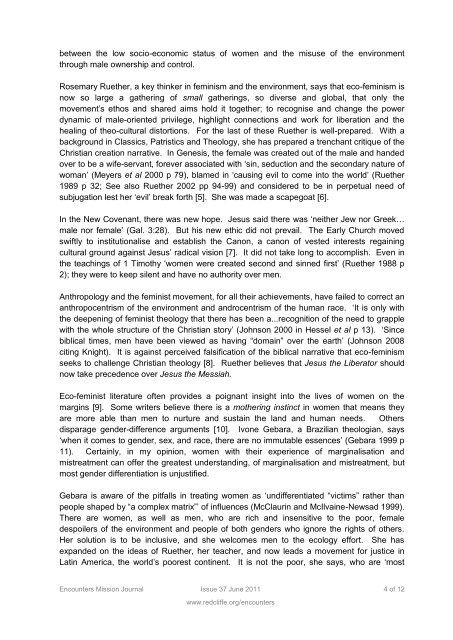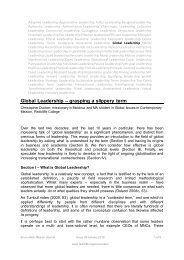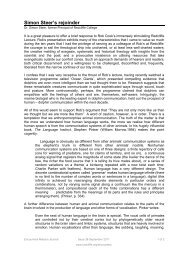The Contribution of Eco-feminism and ... - Redcliffe College
The Contribution of Eco-feminism and ... - Redcliffe College
The Contribution of Eco-feminism and ... - Redcliffe College
You also want an ePaper? Increase the reach of your titles
YUMPU automatically turns print PDFs into web optimized ePapers that Google loves.
etween the low socio-economic status <strong>of</strong> women <strong>and</strong> the misuse <strong>of</strong> the environment<br />
through male ownership <strong>and</strong> control.<br />
Rosemary Ruether, a key thinker in <strong>feminism</strong> <strong>and</strong> the environment, says that eco-<strong>feminism</strong> is<br />
now so large a gathering <strong>of</strong> small gatherings, so diverse <strong>and</strong> global, that only the<br />
movement’s ethos <strong>and</strong> shared aims hold it together; to recognise <strong>and</strong> change the power<br />
dynamic <strong>of</strong> male-oriented privilege, highlight connections <strong>and</strong> work for liberation <strong>and</strong> the<br />
healing <strong>of</strong> theo-cultural distortions. For the last <strong>of</strong> these Ruether is well-prepared. With a<br />
background in Classics, Patristics <strong>and</strong> <strong>The</strong>ology, she has prepared a trenchant critique <strong>of</strong> the<br />
Christian creation narrative. In Genesis, the female was created out <strong>of</strong> the male <strong>and</strong> h<strong>and</strong>ed<br />
over to be a wife-servant, forever associated with ‘sin, seduction <strong>and</strong> the secondary nature <strong>of</strong><br />
woman’ (Meyers et al 2000 p 79), blamed in ‘causing evil to come into the world’ (Ruether<br />
1989 p 32; See also Ruether 2002 pp 94-99) <strong>and</strong> considered to be in perpetual need <strong>of</strong><br />
subjugation lest her ‘evil’ break forth [5]. She was made a scapegoat [6].<br />
In the New Covenant, there was new hope. Jesus said there was ‘neither Jew nor Greek…<br />
male nor female’ (Gal. 3:28). But his new ethic did not prevail. <strong>The</strong> Early Church moved<br />
swiftly to institutionalise <strong>and</strong> establish the Canon, a canon <strong>of</strong> vested interests regaining<br />
cultural ground against Jesus’ radical vision [7]. It did not take long to accomplish. Even in<br />
the teachings <strong>of</strong> 1 Timothy ‘women were created second <strong>and</strong> sinned first’ (Ruether 1988 p<br />
2); they were to keep silent <strong>and</strong> have no authority over men.<br />
Anthropology <strong>and</strong> the feminist movement, for all their achievements, have failed to correct an<br />
anthropocentrism <strong>of</strong> the environment <strong>and</strong> <strong>and</strong>rocentrism <strong>of</strong> the human race. ‘It is only with<br />
the deepening <strong>of</strong> feminist theology that there has been a...recognition <strong>of</strong> the need to grapple<br />
with the whole structure <strong>of</strong> the Christian story’ (Johnson 2000 in Hessel et al p 13). ‘Since<br />
biblical times, men have been viewed as having “domain” over the earth’ (Johnson 2008<br />
citing Knight). It is against perceived falsification <strong>of</strong> the biblical narrative that eco-<strong>feminism</strong><br />
seeks to challenge Christian theology [8]. Ruether believes that Jesus the Liberator should<br />
now take precedence over Jesus the Messiah.<br />
<strong>Eco</strong>-feminist literature <strong>of</strong>ten provides a poignant insight into the lives <strong>of</strong> women on the<br />
margins [9]. Some writers believe there is a mothering instinct in women that means they<br />
are more able than men to nurture <strong>and</strong> sustain the l<strong>and</strong> <strong>and</strong> human needs. Others<br />
disparage gender-difference arguments [10]. Ivone Gebara, a Brazilian theologian, says<br />
‘when it comes to gender, sex, <strong>and</strong> race, there are no immutable essences’ (Gebara 1999 p<br />
11). Certainly, in my opinion, women with their experience <strong>of</strong> marginalisation <strong>and</strong><br />
mistreatment can <strong>of</strong>fer the greatest underst<strong>and</strong>ing, <strong>of</strong> marginalisation <strong>and</strong> mistreatment, but<br />
most gender differentiation is unjustified.<br />
Gebara is aware <strong>of</strong> the pitfalls in treating women as ‘undifferentiated “victims” rather than<br />
people shaped by “a complex matrix”’ <strong>of</strong> influences (McClaurin <strong>and</strong> McIlvaine-Newsad 1999).<br />
<strong>The</strong>re are women, as well as men, who are rich <strong>and</strong> insensitive to the poor, female<br />
despoilers <strong>of</strong> the environment <strong>and</strong> people <strong>of</strong> both genders who ignore the rights <strong>of</strong> others.<br />
Her solution is to be inclusive, <strong>and</strong> she welcomes men to the ecology effort. She has<br />
exp<strong>and</strong>ed on the ideas <strong>of</strong> Ruether, her teacher, <strong>and</strong> now leads a movement for justice in<br />
Latin America, the world’s poorest continent. It is not the poor, she says, who are ‘most<br />
Encounters Mission Journal Issue 37 June 2011 4 <strong>of</strong> 12<br />
www.redcliffe.org/encounters




